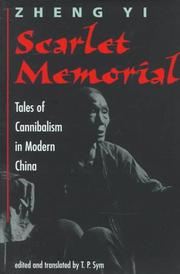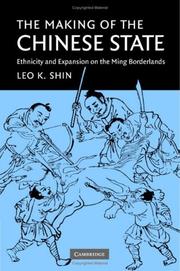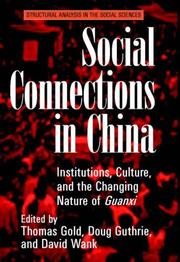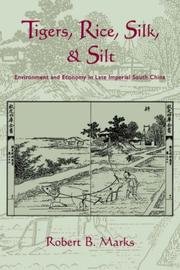| Listing 1 - 6 of 6 |
Sort by
|
Book
ISBN: 9789004285613 9789004290006 9004290001 900428561X Year: 2015 Publisher: Leiden ; Boston Brill
Abstract | Keywords | Export | Availability | Bookmark
 Loading...
Loading...Choose an application
- Reference Manager
- EndNote
- RefWorks (Direct export to RefWorks)
This work is an annotated edition of a ritual manuscript, written in the traditional Zhuang character script. The Hanvueng epic is a narrative in verse about murderous enmity between two royal step-brothers, recited when there is fraternal feuding, death by violence, outbreaks of smallpox, or other such disasters. The theme of enmity is an important one that resonates deeply in the Tai societies on the periphery of the Chinese empire. The narrative touches on many other aspects of life in the valley-kingdoms in the highlands of Guangxi: marriage and inheritance, match-making, slavery and social stratification, agriculture, hunting, fishing, raiding, livestock raising dye-making, wild animals and plants, and the use of ritual to put things to rights.
Epic poetry, Zhuang --- Zhuang literature. --- Chuang literature --- Epic poetry, Chuang --- Zhuang epic poetry --- Zhuang poetry --- Guangxi Zhuangzu Zizhiqu (China) --- Kuang-hsi Chuang tsu tzu chih chʻü (China) --- Guansi-Chzhuanskiĭ avtonomnyĭ raĭon (China) --- Kuang-hsi Chuang tsu tzu chih chʻü --- Kwangsi Chuang Autonomous Region (China) --- Guangxi Zhuang Autonomous Region (China) --- Guangxi Zhuangzu Zizhiqu ren min zheng fu (China) --- Kuang-hsi (China) --- Kwangsi (China) --- 广西壮族自治区 (China) --- Gvangjsih Bouxcuengh Swcigih (China) --- Guangxi Sheng (China)

ISBN: 081332615X Year: 1996 Publisher: Boulder Westview Press
Abstract | Keywords | Export | Availability | Bookmark
 Loading...
Loading...Choose an application
- Reference Manager
- EndNote
- RefWorks (Direct export to RefWorks)
S06/1050 --- 812 Ideologie --- 834 Arbeid --- 841 Politiek Bestel --- 847 Onderwijs --- 855.3 Oorlogsmisdaden/Genocide --- 858.1 Politiek geweld --- 860 (Vredes)cultuur --- 883.2 Oost-Azië --- China: Politics and government--The First Years of the Cultural Revolution (1966-69) --- China --- Guangxi Zhuangzu Zizhiqu (China) --- -History --- -Cultural Revolution, 1966-1976. --- Politics and government --- Cannibalism --- Political crimes and offenses --- Anthropophagy --- Ethnology --- Offenses, Political --- Political offenses --- Crime --- Extradition --- Political violence --- Subversive activities --- Kuang-hsi Chuang tsu tzu chih chʻü (China) --- Guansi-Chzhuanskiĭ avtonomnyĭ raĭon (China) --- Kuang-hsi Chuang tsu tzu chih chʻü --- Kwangsi Chuang Autonomous Region (China) --- Guangxi Zhuang Autonomous Region (China) --- Guangxi Zhuangzu Zizhiqu ren min zheng fu (China) --- Kuang-hsi (China) --- Kwangsi (China) --- 广西壮族自治区 (China) --- Gvangjsih Bouxcuengh Swcigih (China) --- Guangxi Sheng (China) --- History --- Politics and government. --- Kwangsi Chuang Autonomous Region --- Cultural Revolution, 1966-1976 --- Offenses against the State --- State, Offenses against the
Book
ISBN: 0295990791 0295802065 0295990783 9780295802060 9780295990781 9780295990798 9780295990781 9780295990798 Year: 2010 Publisher: Seattle University of Washington Press
Abstract | Keywords | Export | Availability | Bookmark
 Loading...
Loading...Choose an application
- Reference Manager
- EndNote
- RefWorks (Direct export to RefWorks)
Natural resources --- Fan, Chengda, --- Travel --- Guangxi Zhuangzu Zizhiqu (China) --- China --- Description and travel. --- History --- National resources --- Resources, Natural --- Economic aspects --- Fan, Chʻeng-ta, --- Fanchengda, --- 范成大, --- Fan, Shihu, --- Fan, Shih-hu, --- 范石湖, --- Fan, Zhineng, --- Fan, Chih-neng, --- 范致能, --- 范至能, --- Beishanjushi, --- 北山居士, --- Shihujushi, --- 石湖居士, --- Kuang-hsi Chuang tsu tzu chih chʻü (China) --- Guansi-Chzhuanskiĭ avtonomnyĭ raĭon (China) --- Kuang-hsi Chuang tsu tzu chih chʻü --- Kwangsi Chuang Autonomous Region (China) --- Guangxi Zhuang Autonomous Region (China) --- Guangxi Zhuangzu Zizhiqu ren min zheng fu (China) --- Kuang-hsi (China) --- Kwangsi (China) --- 广西壮族自治区 (China) --- Gvangjsih Bouxcuengh Swcigih (China) --- Description and travel --- Resource-based communities --- Resource curse --- Guangxi Sheng (China) --- E-books --- S03/0210 --- S03/0623 --- China: Geography, description and travel--Chinese geography, description and travels: before 1840 --- China: Geography, description and travel--Guangxi

ISBN: 9780521853545 0521853540 9780511523953 9780521189897 0521189896 0511523955 0511837607 Year: 2006 Publisher: Cambridge [England]: Cambridge university press,
Abstract | Keywords | Export | Availability | Bookmark
 Loading...
Loading...Choose an application
- Reference Manager
- EndNote
- RefWorks (Direct export to RefWorks)
In this well-crafted 2006 study of the relationships between the state and its borderlands, Leo Shin traces the roots of China's modern ethnic configurations to the Ming dynasty (1368-1644). Challenging the traditional view that China's expansion was primarily an exercise of incorporation and assimilation, Shin argues that as the centre extended its reach to the wild and inaccessible south, the political interests of the state, the economic needs of the settlers, and the imaginations of the cultural elites all facilitated the demarcation and categorisation of these borderland 'non-Chinese' populations. The story told here, however, extends beyond the imperial period. Just as Ming emperors considered it essential to reinforce a sense of universal order by demarcating the 'non-Chinese', modern-day Chinese rulers also find it critical to maintain the myth of a unified multi-national state by officially recognising a total of fifty-six 'nationalities'.
Guangxi Zhuangzu Zizhiqu (China) --- S06/0240 --- S06/0204 --- S04/0670 --- S11/1210 --- China: Politics and government--Policy towards minorities and autonomous regions --- China: Politics and government--Government and political institutions: Ming --- China: History--Ming: 1368 - 1644 --- China: Social sciences--Works on the national minorities and special groups in China: general and before 1949 (Tibetans, Mongols etc. see Tibet, Mongolia ... but social relations between Chinese and these minorities come here) --- Minorities --- Ethnic minorities --- Foreign population --- Minority groups --- Persons --- Assimilation (Sociology) --- Discrimination --- Ethnic relations --- Majorities --- Plebiscite --- Race relations --- Segregation --- Government policy&delete& --- History --- Kuang-hsi Chuang tsu tzu chih chʻü (China) --- Guansi-Chzhuanskiĭ avtonomnyĭ raĭon (China) --- Kuang-hsi Chuang tsu tzu chih chʻü --- Kwangsi Chuang Autonomous Region (China) --- Guangxi Zhuang Autonomous Region (China) --- Guangxi Zhuangzu Zizhiqu ren min zheng fu (China) --- Kuang-hsi (China) --- Kwangsi (China) --- 广西壮族自治区 (China) --- Gvangjsih Bouxcuengh Swcigih (China) --- Guangxi Sheng (China) --- History. --- Government policy --- Arts and Humanities --- Minorities - Government policy - China - Guangxi Zhuangzu Zizhiqu - History --- Guangxi Zhuangzu Zizhiqu (China) - Ethnic relations - History

ISBN: 052181233X 0521530318 0511177003 0511042302 0511157886 0511304749 0511499574 1280433981 0511045298 9780511042300 9780521812337 9780521530316 9780511045295 9780511157882 9780511499579 1107125529 9781107125520 9781280433986 9780511177002 9780511304743 Year: 2002 Volume: 21 Publisher: Cambridge, UK ; New York : Cambridge University Press,
Abstract | Keywords | Export | Availability | Bookmark
 Loading...
Loading...Choose an application
- Reference Manager
- EndNote
- RefWorks (Direct export to RefWorks)
Guanxi, translated as 'social connections,' or 'social networks,' is among the most important studied phenomena in China today. Guanxi lies at the heart of China's social order, its economic structure, and its changing institutional landscape. It is considered important in every realm of life, from politics to business, and officialdom to street life. This volume offers scholarly thinking on the subject by top China sociologists whose work on guanxi has been influential and by scholars offering insights on the topic. The authors examine the role of guanxi in: business decisions among managers and entrepreneurs; the decisions and practices of workers; the construction of new legal institutions; the new social order. Scholars and students of China will find this a rich source of detailed information on the workings of Chinese social relationships and a valuable, new interpretation of the meaning and place of guanxi today.
Guangxi Zhuangzu Zizhiqu (China) --- Guangxi Zhuangzu Zizhiqu (Chine) --- Social conditions --- Conditions sociales --- Guangxi Zhuangzu Zizhiqu (China) - Social conditio. --- Social Conditions --- Sociology & Social History --- Social Sciences --- China --- S11/0570 --- S11/0540 --- S11/0497 --- S11/0507 --- S11/0705 --- S11/0708 --- China: Social sciences--Guanxi --- China: Social sciences--The Chinese model --- China: Social sciences--Society since 1976 --- China: Social sciences--Daily life: since 1976 --- China: Social sciences--Clan and family: since 1949 --- China: Social sciences--Elite --- Sociology --- Social conditions. --- Kuang-hsi Chuang tsu tzu chih chʻü (China) --- Guansi-Chzhuanskiĭ avtonomnyĭ raĭon (China) --- Kuang-hsi Chuang tsu tzu chih chʻü --- Kwangsi Chuang Autonomous Region (China) --- Guangxi Zhuang Autonomous Region (China) --- Guangxi Zhuangzu Zizhiqu ren min zheng fu (China) --- Kuang-hsi (China) --- Kwangsi (China) --- 广西壮族自治区 (China) --- Gvangjsih Bouxcuengh Swcigih (China) --- Guangxi Sheng (China) --- Social networks --- Business networks --- E-books --- Business networking --- Networking, Business --- Networks, Business --- Industrial clusters --- Strategic alliances (Business) --- Networking, Social --- Networks, Social --- Social networking --- Social support systems --- Support systems, Social --- Interpersonal relations --- Cliques (Sociology) --- Microblogs --- Cina --- Kinë --- Cathay --- Chinese National Government --- Chung-kuo kuo min cheng fu --- Republic of China (1912-1949) --- Kuo min cheng fu (China : 1912-1949) --- Chung-hua min kuo (1912-1949) --- Kina (China) --- National Government (1912-1949) --- China (Republic : 1912-1949) --- People's Republic of China --- Chinese People's Republic --- Chung-hua jen min kung ho kuo --- Central People's Government of Communist China --- Chung yang jen min cheng fu --- Chung-hua chung yang jen min kung ho kuo --- Central Government of the People's Republic of China --- Zhonghua Renmin Gongheguo --- Zhong hua ren min gong he guo --- Kitaĭskai︠a︡ Narodnai︠a︡ Respublika --- Činská lidová republika --- RRT --- Republik Rakjat Tiongkok --- KNR --- Kytaĭsʹka Narodna Respublika --- Jumhūriyat al-Ṣīn al-Shaʻbīyah --- RRC --- Kitaĭ --- Kínai Népköztársaság --- Chūka Jinmin Kyōwakoku --- Erets Sin --- Sin --- Sāthāranarat Prachāchon Čhīn --- P.R. China --- PR China --- Chung-kuo --- Zhongguo --- Zhonghuaminguo (1912-1949) --- Zhong guo --- Chine --- République Populaire de Chine --- República Popular China --- Catay --- VR China --- VRChina --- 中國 --- 中国 --- 中华人民共和国 --- Jhongguó --- Bu̇gu̇de Nayiramdaxu Dundadu Arad Ulus --- Bu̇gu̇de Nayiramdaqu Dumdadu Arad Ulus --- Bu̇gd Naĭramdakh Dundad Ard Uls --- Khi︠a︡tad --- Kitad --- Dumdadu Ulus --- Dumdad Uls --- Думдад Улс --- Kitajska --- China (Republic : 1949- ) --- PRC --- P.R.C. --- BNKhAU --- БНХАУ

ISBN: 0521591775 0511008260 0521027764 0511054297 0511324707 0511150660 1280153229 051151199X 0511116756 1107114314 9780511008269 0511039050 9780511039058 9780511116759 9780521591775 9780511511998 9780521027762 Year: 2006 Publisher: Cambridge Cambridge University Press
Abstract | Keywords | Export | Availability | Bookmark
 Loading...
Loading...Choose an application
- Reference Manager
- EndNote
- RefWorks (Direct export to RefWorks)
Challenging the conventional wisdom conveyed by Western environmental historians about China, this book examines the correlations between economic and environmental changes in the southern Chinese provinces of Guangdong and Guangxi from 1400 to 1850, but also provides substantial background from 2CE on. Robert Marks discusses the impact of population growth on land-use patterns, the agro-ecology of the region, and deforestation; the commercialization of agriculture and its implications for ecological change; the impact of climatic change on agriculture; and the ways in which the human population responded to environmental challenges. This book is a significant contribution to both Chinese and environmental history. It is groundbreaking in its methods and in its findings.
S20/0500 --- S04/0670 --- S10/0210 --- Economic development --- -Human beings --- -Nature --- -Homo sapiens --- Human race --- Humanity (Human beings) --- Humankind --- Humans --- Man --- Mankind --- People --- Hominids --- Persons --- Development, Economic --- Economic growth --- Growth, Economic --- Economic policy --- Economics --- Statics and dynamics (Social sciences) --- Development economics --- Resource curse --- China: Agriculture forestry, fishery, natural disasters--Environmental policy, pollution --- China: History--Ming: 1368 - 1644 --- China: Economics, industry and commerce--General works and economic history: before 1840 --- Environmental aspects --- -History --- Effect of environment on --- Effect of human beings on --- China --- Guangdong Sheng (China) --- -Guangxi Zhuangzu Zizhiqu (China) --- -Economic conditions --- Economic conditions --- Arts and Humanities --- History --- -China: Agriculture forestry, fishery, natural disasters--Environmental policy, pollution --- Economic development - Environmental aspects - Chi. --- Guangxi Zhuangzu Zizhiqu (China) --- Kuang-hsi Chuang tsu tzu chih chʻü (China) --- Guansi-Chzhuanskiĭ avtonomnyĭ raĭon (China) --- Kuang-hsi Chuang tsu tzu chih chʻü --- Kwangsi Chuang Autonomous Region (China) --- Guangxi Zhuang Autonomous Region (China) --- Guangxi Zhuangzu Zizhiqu ren min zheng fu (China) --- Kuang-hsi (China) --- Kwangsi (China) --- 广西壮族自治区 (China) --- Gvangjsih Bouxcuengh Swcigih (China) --- 广东省 (China) --- Kwangtung, China (Province) --- Kuang-tung sheng jen min cheng fu (China) --- Kuang-tung sheng (China) --- Kanton-shō (China) --- Kwangtung (China) --- Kwangtung Province (China) --- Guangdong (China) --- Guangdong Province (China) --- Kuang-tung (China) --- Guang dong (China) --- Guangdong Sheng ren min zheng fu (China) --- 广东省人民政府 (China) --- -Kuang-hsi Chuang tsu tzu chih chʻü (China) --- Cina --- Kinë --- Cathay --- Chinese National Government --- Chung-kuo kuo min cheng fu --- Republic of China (1912-1949) --- Kuo min cheng fu (China : 1912-1949) --- Chung-hua min kuo (1912-1949) --- Kina (China) --- National Government (1912-1949) --- China (Republic : 1912-1949) --- People's Republic of China --- Chinese People's Republic --- Chung-hua jen min kung ho kuo --- Central People's Government of Communist China --- Chung yang jen min cheng fu --- Chung-hua chung yang jen min kung ho kuo --- Central Government of the People's Republic of China --- Zhonghua Renmin Gongheguo --- Zhong hua ren min gong he guo --- Kitaĭskai︠a︡ Narodnai︠a︡ Respublika --- Činská lidová republika --- RRT --- Republik Rakjat Tiongkok --- KNR --- Kytaĭsʹka Narodna Respublika --- Jumhūriyat al-Ṣīn al-Shaʻbīyah --- RRC --- Kitaĭ --- Kínai Népköztársaság --- Chūka Jinmin Kyōwakoku --- Erets Sin --- Sin --- Sāthāranarat Prachāchon Čhīn --- P.R. China --- PR China --- Chung-kuo --- Zhongguo --- Zhonghuaminguo (1912-1949) --- Zhong guo --- Chine --- République Populaire de Chine --- República Popular China --- Catay --- VR China --- VRChina --- 中國 --- 中国 --- 中华人民共和国 --- Jhongguó --- Bu̇gu̇de Nayiramdaxu Dundadu Arad Ulus --- Bu̇gu̇de Nayiramdaqu Dumdadu Arad Ulus --- Bu̇gd Naĭramdakh Dundad Ard Uls --- Khi︠a︡tad --- Kitad --- Dumdadu Ulus --- Dumdad Uls --- Думдад Улс --- Kitajska --- Human beings --- Nature --- Homo sapiens --- Environmental aspects&delete& --- Effect of environment on&delete& --- Effect of human beings on&delete& --- Guangxi Sheng (China) --- Economic conditions. --- History. --- Développement économique --- Homme --- Aspect de l'environnement --- Histoire --- Influence sur la nature --- Influence de l'environnement --- History of Asia --- anno 1500-1799 --- anno 1400-1499 --- anno 1800-1899
| Listing 1 - 6 of 6 |
Sort by
|

 Search
Search Feedback
Feedback About UniCat
About UniCat  Help
Help News
News